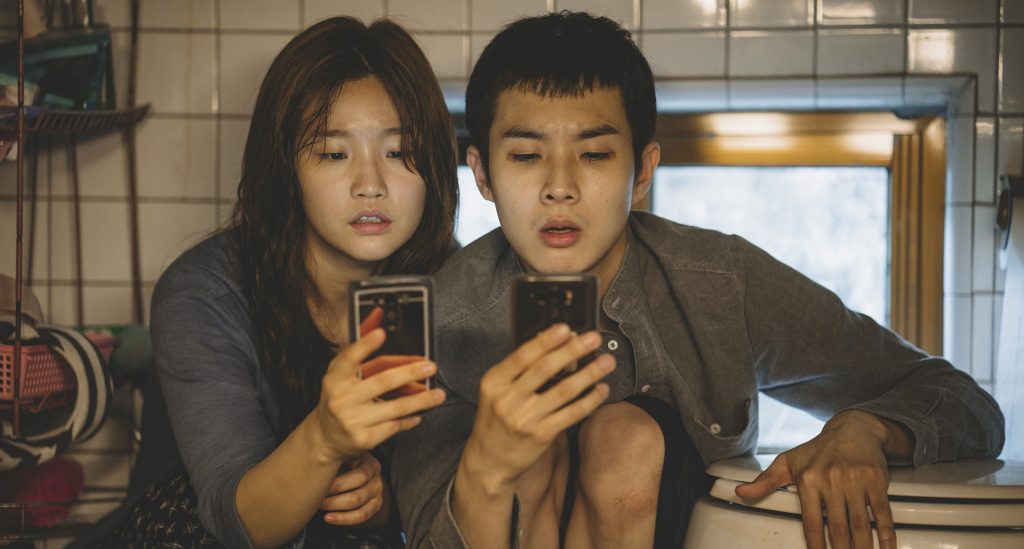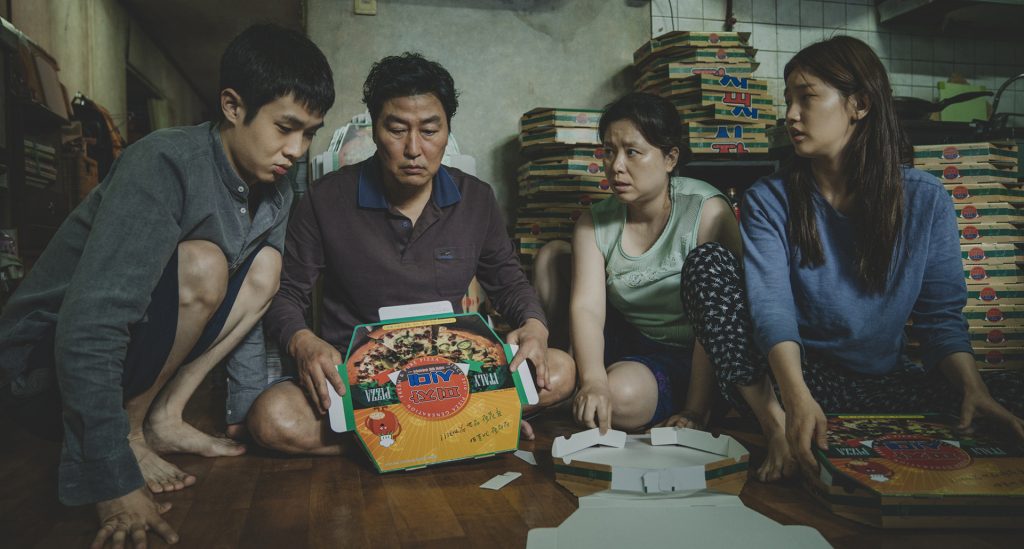Bong Joon-ho’s tale of poverty and capitalism at its worst has so far won over 200 awards. Here is Jess Clayton-Berry’s review Parasite.
Nearly everyone has heard of Parasite by now. Directed by Bong Joon-ho, this record-breaking masterpiece became the first non-English speaking film to ever win Best Picture at the Oscars. But it’s more than just the numbers; Parasite paints a picture of class divide, highlighting the struggles of unemployment but also capitalism as a whole.
This South Korean dark comedy begins in a banjiha, an apartment half submerged underground with the tiny windows close to the ceiling being the only source of sunlight. This is where the Kim family live, with father Ki-taek (Song Kang-ho), mother Chung-sook (Chang Hyae-jin), daughter Ki-jung (Park So-dam) and son Ki-woo (Choi Woo-shik). Over 360,000 South Koreans live in banjiha’s for the sake of cheap rent in a time when housing is expensive in South Korea. They were originally intended as bunkers in the 1970s in case North Korea attacked but have now been mostly converted into cheap rental units. There is no word for a banjiha in English, so for the sake of Parasite, the term ‘semi-basement’ was invented to describe the living quarters of the Kim family who are living on the scraps of temporary jobs just to by and escape from the mould-ridden squalor that is their home.
Parasite can be compared to a Greek tragedy; at rock-bottom, the Kim family are visited by Min-hyuk, a university student who is friends with Ki-woo. Min-hyuk gifts the Kim family with a scholar’s rock, which is thought to bring good fortune. He then tells Ki-woo that he has a placement abroad, suggesting Ki-woo replace him as tutor for the wealthy Park family’s daughter, Park Da-hye (Jung Ziso). Ki-woo takes the opportunity, his artistic sister forges some Oxford University documents and Ki-woo applies for the job under the disguise of a student. But the Park family do not care about his made-up qualifications; simply knowing the right person is enough for Ki-woo to get the job. An opportunity is revealed and this is the beginning of their rise to fortune.

Parasite’s storyline continues to unfold with the Park family requiring an art student for their prodigy son, so Ki-woo recommends his sister who goes under another name and pretends to be an established art teacher. Once again, the right connections prevail over qualifications. The Kim family then begin to con the Park family into hiring them all. We know at some point there will be a downfall; it’s all too good to be true and the tension builds as the audience anticipates the moment the deception is found out. Now fully employed, the Kim family struggle to keep up appearances; the class divide being further shown when it’s noted that they even smell differently to the Park family, each carrying the lingering scent of the semi-basement they return home to.
The settings are key to painting the picture of class divide in Parasite. Director Bong Joon-ho is accustomed to playing with claustrophobic settings in his previous films. In Parasite, we see very little of the outside world with the cameras primarily focusing on the differentials between the Kim family’s semi-basement and the luxurious modern home the wealthy Park family live in. Kyung-pyo Hong’s masterful cinematography symbolises wealth as being above ground-level, with wide open spaces and a cool colour palette. The poorer side is in cramped underground levels, with little natural light other than the sickly yellow or green fluorescent lighting. The Park family’s windows go from floor to ceiling, showing off their vast garden overlooking the cramped streets of Seol; the Kim family’s narrow windows present the dirty floor of the street above, every night they watch the same drunk man relieve his bowels outside their home.
The parallels between the families show the stark contrast between the worries of the rich and the worries of the poor. Whilst the Kim family struggle to put food on the table, businesses man Mr Park (Lee Sun-kyun) comes home from work to treat his son with an abundance of expensive gifts. Whilst the Kim family must lie and con their way into employment, the paranoid wife, Yeon-kyo (Cho Yeo-jeong) fires staff based off the rumours the Kim family feed her.
It’s unsure who the title of the film refers to. A parasite is a creature that feeds off the nutrients of another being. The Kim family do this by desperately conning the Park family in order to feed themselves. In one of the first scenes of the film, the Kim family have constructed pizza boxes for a delivery company to earn some extra cash but their employer is not happy with the poor results. But then they hear the company is struggling enough with an unreliable employee and one by one the Kim family fly into the frame like predators. They are professional scavengers driven by desperation. They know exactly what to do and their cunning sales pitch to hire one of their own in the role instead gives us a premonition of their future tactics. They even leave their window open upon seeing street fumigators in hopes of their own bug-infested semi-basement being treated for free – even if this means choking on the fumes.

But on the other hand, the Park family are incapable of functioning without their staff – willing to fill in any gaps by hiring someone they know very little about. It’s repeatedly mentioned that the Park family are nice people whereas the Kim family are shown to be taking advantage of this. But ultimately we see the gaps in this facade; the Park family care little for the poor, they hate the smell of people who ride public transport and are unwilling to help anyone other than themselves. The Kim family are breaking the law, but in a system so flawed that simply having higher connections is enough to win a job over someone who has worked hard for a degree or has years of work experience, we see very little chance of the Kim family otherwise making it out of their current situation. In Parasite there are no villains, just the ambition to survive.
It’s impossible to know what you’re about to walk into when you watch Parasite. The plot is neatly split into two acts; the first being a steady rise in tension but maintaining its dark humour, the second cranks the tension up to a whole new level and entirely unravels the build-up into a tremendous finale. You cannot predict how it will end. Initially intended to be a theatre production, Parasite’s writing is so superb you could take away all the attractive cinematography, the beautifully composed score, and detailed sets and it would still be a tremendous production. This is a film truly worth watching – even if you’re not a fan of subtitles. It’s the kind of film that leaves you thinking about it days after you left the cinema. It’s funny, but at the same time disturbing. It’s thought-provoking and tragic. Boon perfectly described this film when he said it was ‘a comedy without clowns, a tragedy without villains’. Despite the tough competition, Parasite was a well-deserved Best Picture winner.